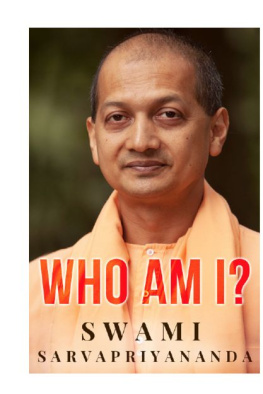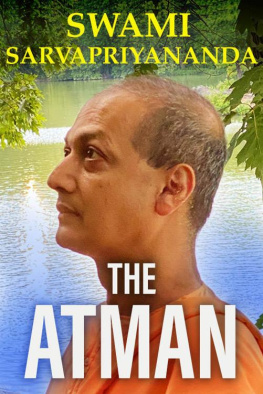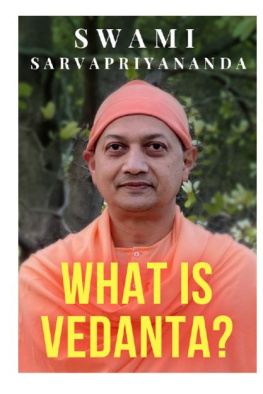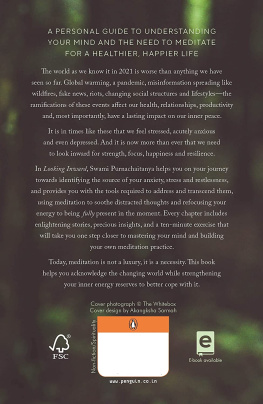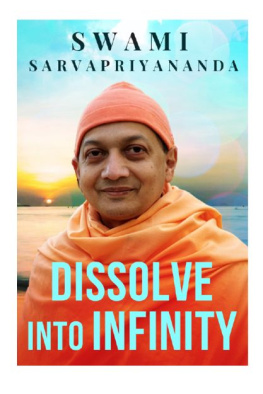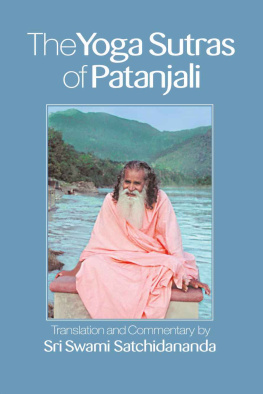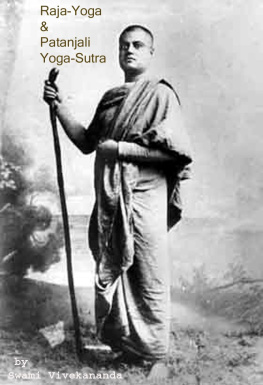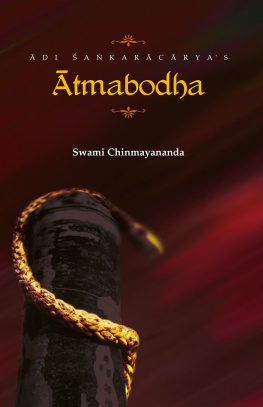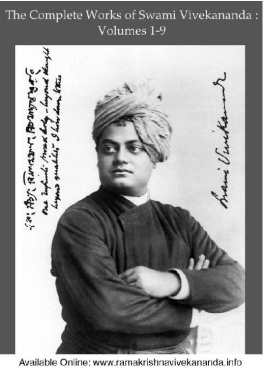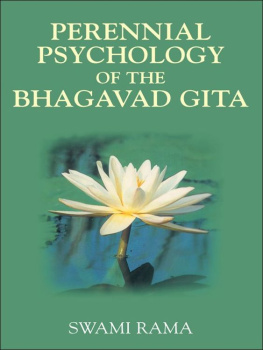Swami Sarvapriyananda - Who Am I?
Here you can read online Swami Sarvapriyananda - Who Am I? full text of the book (entire story) in english for free. Download pdf and epub, get meaning, cover and reviews about this ebook. year: 2021, genre: Religion. Description of the work, (preface) as well as reviews are available. Best literature library LitArk.com created for fans of good reading and offers a wide selection of genres:
Romance novel
Science fiction
Adventure
Detective
Science
History
Home and family
Prose
Art
Politics
Computer
Non-fiction
Religion
Business
Children
Humor
Choose a favorite category and find really read worthwhile books. Enjoy immersion in the world of imagination, feel the emotions of the characters or learn something new for yourself, make an fascinating discovery.
- Book:Who Am I?
- Author:
- Genre:
- Year:2021
- Rating:3 / 5
- Favourites:Add to favourites
- Your mark:
- 60
- 1
- 2
- 3
- 4
- 5
Who Am I?: summary, description and annotation
We offer to read an annotation, description, summary or preface (depends on what the author of the book "Who Am I?" wrote himself). If you haven't found the necessary information about the book — write in the comments, we will try to find it.
Who Am I? — read online for free the complete book (whole text) full work
Below is the text of the book, divided by pages. System saving the place of the last page read, allows you to conveniently read the book "Who Am I?" online for free, without having to search again every time where you left off. Put a bookmark, and you can go to the page where you finished reading at any time.
Font size:
Interval:
Bookmark:

Who Am I?
Mandukya Upanishad
The subject is the most ancient of questions Who am I? We will investigate this question in light of the Upanishads.
Vedanta consists of the teachings of the Upanishads. Vedanta nama upanishad pramanam this is the definition of Vedanta. It means that Vedanta is the source of spiritual knowledge called the Upanishads. The Upanishads present the highest philosophical teachings of the Vedas and they are among the most ancient texts known to humanity. There are many Upanishads. In fact, in one of the Upanishads called the Muktika Upanishad, we find a list of 108 Upanishads. Among these, 10 are called major Upanishads because Adi Shankaracharya chose these 10 to write his commentaries or Bhashyam . These Upanishads are the foundational texts of Vedanta. Adi Shankaracharya gave a non-dualistic interpretation to these Upanishads and so the school of Vedanta associated with him is called Advaita (non-dual) Vedanta. We will follow this interpretation.
Among all the major Upanishads, there is one - the shortest of all these texts - the Mandukya Upanishad, which is perhaps also the most powerful Upanishad. There is a saying that for those who want spiritual enlightenment, Mandukya Upanishad alone is sufficient. Mumuksunam vimuktaye Mandukyam ekam eva alam .. for those who seek Moksa, the Mandukya alone is sufficient. It consists of only 12 mantras and it is like the little chili pepper which is small but very hot!
In the Mandukya Upanishad, the seventh mantra is the most important mantra. It answers the great question, Who am I? It is one of the finest mantras found in our Upanishads. And I havent found a more sophisticated, more profound answer in any of the literature of the world religions or philosophies which I have come across.
The Mandukya Upanishad was commented upon by Gaudapadacharya. Gaudapadacharyas disciple was Govindapada and Govindapadas disciple was Adi Shankaracharya. Gaudapadas commentary on the Mandukya Upanishad is called the Mandukya Karika and is in the form of verses. So nowadays when you study the Mandukya Upanishad, you study the Mandukya Karika as well. Adi Shankaracharya wrote a commentary explaining not only the original Upanishadic mantras, but also the karikas. So we usually study the Mandukya Upanishad along with Gaudapadas karikas and Shankaracharyas bhashya.
About 10 years ago, I lived for a while in solitude in the high Himalayan region in Gangotri. I stayed in a log cabin, with no electricity or furniture, just a blanket on the floor and some blankets to cover myself with. I spent my time meditating and studying. Without electricity, it used to be so dark inside the cabin that if I waved my hands before my eyes, I couldnt see them. Occasionally I would see sparks of static electricity from my blankets and clothes. It was difficult to even step out of the cabin in the dark.
One day after bhiksha , I was strolling with a few monks with whom I had made acquaintance. We were walking through the forest trails among the lush deodar and pine trees, with the Ganga flowing fast far below, and in this serene setting, one of the monks told me a story which goes like this:
Raja Janaka and Ashtavakramuni
Raja Janaka was fast asleep one night, when he was woken up by his sentry with news of an enemys attack on his kingdom. The king hastily summoned his generals and soldiers and proceeded to the battlefield. There ensued a fierce battle in which Raja Janaka was eventually defeated and captured. The wounded Raja Janaka was dragged before the enemy king who said, I have captured your kingdom but I wont kill you. Instead I will exile you. Now what could the poor, defeated and exiled Raja Janaka do? Exhausted, bleeding and depressed, he somehow started to walk. People from his own capital city refused to give him food or water because they feared the new king. The new king is very cruel, they said. If he finds out that we helped you, we will be punished.
Hungry and thirsty, he continued walking and it took him two days to reach the border of his kingdom. As he crossed the border to the next kingdom he reached a place where the poor were being served food. He joined the line and as soon as he approached the front of the line and was about to be served, the servers ran out of food and announced, No more food. Janaka was exhausted, depressed and in great pain. Seeing his condition, the server offered him the starch stuck at the bottom of the utensil, which Janaka readily accepted as the last respite. The server handed him a bowl of starch but before he could lift it to his lips with his trembling hands, a kite circling above swooped in and knocked it off his hands and the bowl went rolling into the dust. Seeing this, Raja Janaka was overcome with misery and collapsed on the ground and wept. As he was crying, he suddenly heard a voice. Maharaja, what happened? Hearing this he woke up. With chest pounding, and body covered in sweat, he sat on his bed, when the sentry said again Maharaja, you were crying, what happened?
It was all just a nightmare! But since Raja Janaka was a philosopher-king, he had an analytical mind. He asked , Was that true or is this true? Yeh sach, yaa woh sach? Unable to comprehend the kings question the sentry called the minister to whom Raja Janaka repeated, Was that true or is this true? When the minister failed to understand, the Queen came to speak with him, but he kept repeating, Was that true or is this true? No one could understand what he meant!
During this time, Ashtavakramuni, the great sage, was visiting the city. While he was in the marketplace he learned about Raja Janakas condition and went to the court to inquire after him. The king, surrounded by his ministers and queen, repeated, Was that true or is this true?
Ashtavakramuni, being an enlightened sage, immediately understood what the king meant. He asked the king, Raja Janaka, when you were rolling in the dust, bleeding, defeated, depressed and crying, during those moments were all these there your power, your ministers, your court?
Raja Janaka said, No, there was only defeat and depression.
Ashtavakramuni asked again, And now you are here sitting in your court with your courtiers. Those wounds and defeat that you experienced, are they here?
The king once again said, No, they are not here.
Then Ashtavakramuni said to the king, Then, Raja Janaka, neither this is true nor that is true.
Raja Janaka was shocked to hear this and wondered aloud, Is nothing true then?
Ashtavakramuni asked again, Raja Janaka, were you there on the battlefield?
It may be false but yes, I experienced it, replied the king.
And now, here in your court are you not experiencing all this? Then, Raja Janaka, neither this is true, nor that is true, but you, the witness of both, you alone are the truth!
The Fourth - Turiya
Now let us try to understand the meaning of this story. The meaning of this story and the meaning of the seventh mantra of the Mandukya Upanishad are exactly the same. When Raja Janaka was in a waking state like us, he was the waker. The waker experiences the waking world. And when Raja Janaka was dreaming, he was the dreamer who experienced the dream world. Besides these two, there is another state which we all go through, which is the deep sleep state where there are no dreams. We can refer to a person in this state as a sleeper who experiences a blankness.
What the Mandukya Upanishad tells you is that you are not these three - not the waker, not the dreamer and not the sleeper. What you actually are, is the fourth - called Turiya which simply means number four. The mantra uses the term chaturtham , which means fourth. The term Turiya was introduced by Gaudapada. The defeated and exiled Raja Janaka in the dream world was not real but there was the fourth who was watching, and this fourth was that which is always real. This is what Ashtavakramuni was trying to tell Raja Janaka. Similarly, we are in the waking state which is not ultimately real, but there is the fourth that is watching - that is real. I am not calling the fourth a state because it is not a state like waking, dreaming or deep sleep. Turiya is the reality - the one consciousness - underlying the three states.
Font size:
Interval:
Bookmark:
Similar books «Who Am I?»
Look at similar books to Who Am I?. We have selected literature similar in name and meaning in the hope of providing readers with more options to find new, interesting, not yet read works.
Discussion, reviews of the book Who Am I? and just readers' own opinions. Leave your comments, write what you think about the work, its meaning or the main characters. Specify what exactly you liked and what you didn't like, and why you think so.

